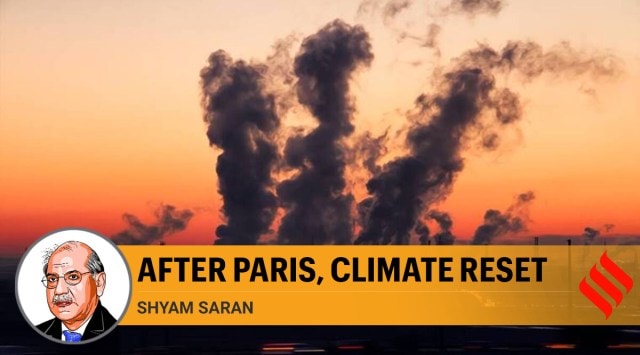- India
- International
Adaptation, not mitigation, should inform India’s climate strategy
Shyam Saran writes: At the climate change negotiation table, India needs to safeguard its interests and enhance its development prospects.
 The consequences of climate change are already upon us and even with the most ambitious mitigation action, will continue to impact the world. (File Photo)
The consequences of climate change are already upon us and even with the most ambitious mitigation action, will continue to impact the world. (File Photo) Countries Across the world are gearing up for the 26th Conference of Parties (COP) to the UN Framework Convention on Climate Change (UNFCCC) to be convened in November this year at Glasgow. The COP was originally scheduled to be held last year but, like several other international conferences, it was delayed due to the COVID-19 pandemic. The forthcoming COP will be important because this will be the first occasion after the Paris Climate agreement concluded in 2015 that countries will be expected to “ratchet up” the nationally determined commitments they made as part of that agreement.
Those original commitments to mitigate greenhouse gas emissions, chiefly carbon emissions, would, in the aggregate, put the planet on track towards a 3 degrees centigrade temperature rise by the end of the current millennium, far beyond the 1.5 degree limit that science considers to be a relatively safe threshold. The European Union (EU), the UK, Japan and South Korea have announced more ambitious targets. The EU and the UK have pledged to reduce their carbon emissions by 55 per cent in 2030 with 2000 as the base year. They have also pledged to achieve “carbon neutrality” or zero carbon emissions by 2050. The US, under the incoming Biden administration, has rejoined the Paris Agreement. It is expected to announce a carbon neutrality commitment for 2050. China has announced that it will achieve carbon neutrality by 2060 and this has been welcomed by other major economies.
It is anticipated that the Biden administration may engage with China to come up with a template for COP-26 just as their leaders, Barack Obama and Xi Jinping, were able to do in advance of the Paris Climate summit. That template did not take into account India’s interests despite China being part of the BASIC group of Brazil, South Africa, China and India which, as major emerging economies, had been taking coordinated positions at multilateral climate negotiations. Going forward, India must delink itself from China, let BASIC become a consultative forum only and reconstruct a larger coalition of developing countries whose climate change goals are more aligned with its own. After Paris, BASIC has lost whatever rationale it originally possessed.
There will be some important international conferences before COP-26, where major efforts are expected to set down an agenda for that meeting. Biden has called for a summit of major emitting nations on April 22 in order to persuade them to commit to ambitious mitigation targets. It is reported that the US may announce its own NDC at the meeting which could include a commitment to reduce its emissions by 50 per cent by 2030 though it is not clear whether this will be with 2000 as the base year or 2005 as was the case with the earlier pledge.
In June there will be a G-7 summit of western countries and Japan to which India has been invited by host Prime Minister Boris Johnson of the UK. Since COP-26 will be held in Glasgow, the UK has let it be known that climate change would be at the top of the summit agenda.

What should India’s stance be at these meetings? Both for India and other developing countries, it is important that mitigation does not overshadow other key elements of the Paris Climate agreement. There has been step-motherly treatment of adaptation, which is a bigger challenge for most developing countries than mitigation is. The consequences of climate change are already upon us and even with the most ambitious mitigation action, will continue to impact the world since greenhouse gases accumulated in the earth’s atmosphere diminish only gradually. Adaptation should have equal billing with mitigation whenever and wherever climate change action is being deliberated upon.
The developed countries had committed themselves to providing $100 billion a year in climate finance to developing countries up to 2020 to enable them to expand their climate change action. There was a pledge to increase the size of this funding significantly in the period 2021-2025. Even by the very accommodative accounting methods used by the OECD, the actual flows have fallen far short, being only $79 billion in 2018. A more accurate reading is $11 billion in grants the same year. Our own ministry of finance has estimated that there has been only a billion dollars in new and additional finance transferred to developing countries annually against the $100 billion pledge. It is therefore important for India to highlight the finance component as this will also enable the mobilisation of other developing countries, in particular small and medium countries and small island developing states.
My own experience as a climate negotiator in the run-up to and in the course of the climate summit of 2009 has been that these countries look up to India to provide intellectual leadership in a domain that is often quite technical and complex. They often take the cue in negotiations from India and will do so even more as China makes its own deals with the advanced industrialised economies. Nothing is to be gained by accepting an invitation to sit at the high table with the big boys. For this dubious privilege, India may find itself under pressure to commit to decisions that limit rather than enhance its development prospects. One should not yield to pressures to declare a peaking year for India’s carbon emissions or to follow China into declaring a target year for carbon neutrality.
There is a relentless effort by the US and Western European countries to include climate change on the UN Security Council (UNSC) agenda. At a recent UNSC meeting, this was strongly opposed by Russia and by India but the Chinese climate envoy, Xie Zhenhua, appears to have adopted a supportive stance. This is an ominous trend and must be prevented from going any further. We will need to work out a persuasive case for opposing it since a large number of countries seem to believe that climate change is indeed a security issue and needs to be treated as such. The potentially menacing intent behind it should be exposed.
It is evident that India needs to fashion a fresh strategy on climate change negotiations to safeguard its interests, contribute to a global climate regime that enhances and does not diminish India’s development prospects and helps the country both to adapt to climate change that is already taking place and to accelerate its transition to a low carbon growth trajectory.
This article first appeared in the print edition on March 6, 2021 under the title ‘After Paris, climate reset’. The writer is a former foreign secretary and senior fellow CPR. He was Prime Minister’s Special Envoy for Climate Change 2007-10.
40 Years Ago
EXPRESS OPINION
More Explained
Apr 18: Latest News
- 01
- 02
- 03
- 04
- 05









































